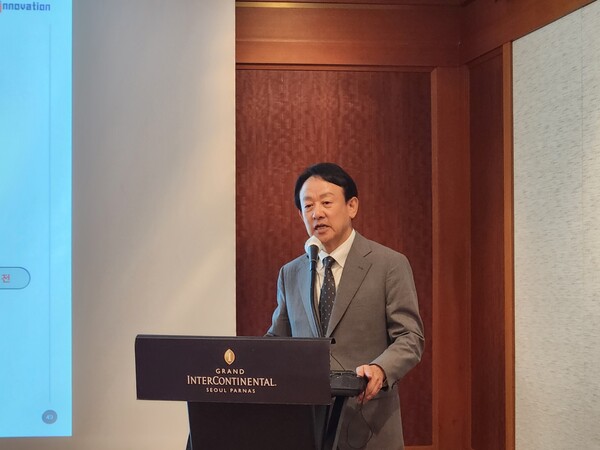GI Innovation expressed its intention to pursue a license out deal for GI-301, an allergy treatment, with Japanese companies at a press conference at the Grand InterContinental Seoul Parnas Hotel, in southern Seoul, on Monday.

"We are currently in talks with three Japanese pharmaceutical companies to transfer technology for GI-301, and we will finalize the transfer within this year," said GI Innovation CEO and Chairman Rhee Byung-gun.
GI-301 was transferred to Yuhan Corp. in July 2020 for 1.4 trillion won (approximately $1.1 billion) for the global rights which excludes Japan. It is currently in phase 1b clinical trials in Korea.
However, as Yuhan wishes to present the phase 1b results at a conference overseas in November, Rhee did not go into further details about the progress of the trial except for elaborating that meetings are currently being held between GI Biome, Yuhan, and global companies.
Rhee also explained that they wish to have a clinical trial personnel from GI Innovation dispatched to the transferring company to ensure the smooth progress of clinical trials together.
"Technology transfer is only an intermediate step,” he emphasized
The company also provided an update about their most promising pipelines and strategy for GI-101, GI-102,GI-108.
Specifically, GI Innovation’s Chief Scientific Officer, Jang Myoung-ho, explained how GI-Biome microbiome candidate is being used in synergy with drugs from the GI Cell pipeline such as GI-10N as well as other drugs in the GI-innovation pipeline such as GI-101, 102, and 108.
“We are looking at ways in which in which we can boost the penetrating effect of tumors by using microbiome drugs together with the immunology drugs in our pipeline, especially for metastatic cancers.”
Additionally, the company also introduced, GI-108, a fourth-generation metabolic immuno-oncology drug designed to inhibit CD73 overexpression in tumors.
"GI-108 has already completed the production of clinical drug substance in collaboration with Samsung Biologics and is expected to be submitted for clinical planning in the first half of next year," said Koh Young-jun, Head of Translational Strategy Division at GI Innovation.
Koh showed data that highlighted GI-108’s ability to inhibit CD73 antigen by three times more compared to AstraZeneca's olecumab and also showed superior antitumor efficacy in inhibiting tumor growth compared to Keytruda.
"GI-108 has already completed the production of clinical raw materials in collaboration with Samsung Biologics, and an IND application will be possible in the first half of next year," said Koh. "We plan to establish an approval strategy with Medirama to conduct global clinical trials specialized for specific cancer types."
Rhee also mentioned that the company will seek technology transfers for GI-101 and GI-102, the company's lead candidates.
GI-101 is a novel bispecific CD80-lgG4Fc-IL-2v immune oncology candidate and is currently undergoing phase 1/2 clinical trials. It recently got approved for a new manufacturing process which is expected to improve the pharmacokinetic and pharmacodynamic properties due to the increased sialic acid content, which delays the aging of the protein, increases the half-life and duration of activity.
Meanwhile, GI-102 is being developed to treat cancer patients when immuno-oncology is not effective and has already started clinical trials in Korea and is expected to enter clinical trials in the U.S.
Related articles
- 'FDA Project Optimus set to affect all cancer drug developers, not just in the U.S.'
- Breakthrough in stem cell transplants: half-matched donors now viable for blood cancer treatment
- Lotte Biologics, Kanaph Therapeutics pursue joint ADC tech platform
- Evolving drug modalities propel Korean oncology drug development amid challenges
- GI Biome, ProGen to work on next-gen obesity treatment
- GI Innovation nets European patent for allergy microbiome combo
- GI Innovation licenses out allergy treatment to Japanese firm

